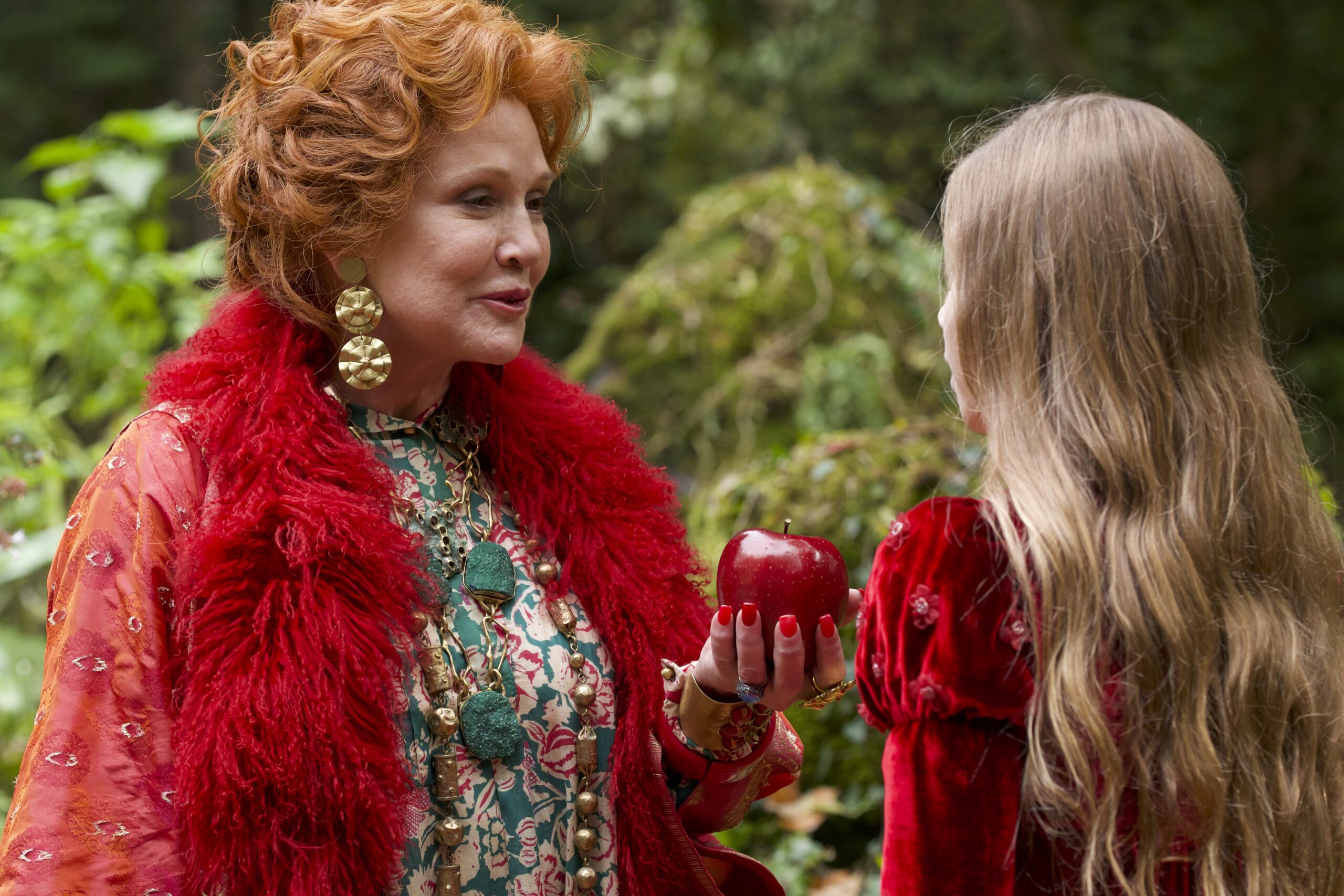(Strange Quark Films)
Vertical Entertainment, 2023. Fantasy. 96 min.
Grade: 3 out of 4
Somehow, Carrie Fisher has returned. Temporarily, anyway. Seven years after the iconic actress died, her final film is seeing the light of day. In Wonderwell, a modern fairy tale, she plays a witch named Hazel (get it?) with bright orange hair, all the better to also recall her late mother with. As in The Rise of Skywalker, her previous “final” film, she plays magical mentor to a girl who’s tired of the awful status quo in her life.
That girl, Violet (newcomer Kiera Milward), who is at 12 considerably younger than Star Wars‘ Rey, finds herself in a small Italian town with her parents as her teenage sister Savannah (Nell Tiger Free) is a finalist for a high-profile modeling campaign run by fashion superstar Yana (Rita Ora), who might just be a witch as well. Violet both envies her older sister’s autonomy to be a model, and finds herself horrified by how dehumanizing the process becomes. That’s not even to mention how easily her parents are seduced by dollar signs, and her father by Yana.
Escaping from the walled city to the forest outside, she encounters Hazel, and falls into a variation of Alice’s rabbit-hole/looking-glass, in this case a mystical drain covered by a giant plug (a callback to a very awkward metaphor for sexuality, as described by her dad). Switching places with her otherworldly double, she’s warned she must return by sunrise if she wants to return and have her actions in the new realm cause no consequences.
On the other side of this “Wonderwell,” the major difference is that red vines and flags are everywhere, literally and metaphorically, and Yana’s a bit more overt about being a witch. She and Hazel – who sometimes takes the form of a giant floating head, a la The Wizard of Oz – argue about a magic key in the form of a hereditary flower to be passed down. Flowers like to wrap around Violet’s wrist, giving her the belief that she may be a burgeoning witch herself. But she doens’t think much about the blooms themselves until Hazel bluntly informs her, “They’re actually sexual organs.” That’s the Fisher we know and love, but don’t always see onscreen – the dirty grandma with a heart of gold and a mouth in need of soap.
First-time feature director Vlad Marsavin pulls from all the best modern fairytale influences, from the obvious Alice and Oz to the likes of Spirited Away and Coraline. For a time, it doesn’t feel like he’s adding much to them beyond the blend, but by the end, even as the conflict between the two witches gets confusing, the central theme comes into focus. Without spoiling too much, let’s just say that the use of red on the flipside is akin to that in Pixar’s Turning Red. In their own ways, both the old Italian architecture and the new set dressing give this the feel of, shall we say, a period piece. Appropriate, just-real-enough CG adds slithering vines, carnivorous plants, and fabulous insects which augment the atmosphere to keep literal-minded parents from becoming easily offended too quickly.
Fisher and Ora will be the audience draws, and they make it worthwhile – Ora convincingly pretends she understands the convoluted fantasy dialogue, while Fisher convinces that she’s at least having fun with it. It’s just as well, because the actual story action doesn’t consist of much beyond Violet trying to persuade Savannah that being a supermodel will be miserable and make her fetish-prey. As Daniele, the boy in between Violet and Savannah’s ages who catches both of their fancies, British actor Sebastian Croft (Heartstopper) unfortunately lacks the same appeal to the audience. Burdened with a fake Italian accent and an absence of personality besides being a doormat to stepmom Yana and her minions, he doesn’t seem like the type to offer much of a push to female hormonal awakenings.
Writer William Brookfield, adapting his own short story “Drainhole Dreaming,” shows a savvy understanding of how parental romantic behavior can solidly screw up the perceptions of kids just trying to figure it out, especially if mom and dad are having problems and acting frivolous in their affectiosn elsewhere. The movie doesn’t dive too far into that particular deep end, but acknowledging it at all in a way that balances adult and child perspectives to both full extents is rare and refreshing.
Carrie Fisher may be remembered for Star Wars, but closing out her career with a fantstical look at effed-up parents and the casual harm they do their kids’ paths into adulthood seems somehow appropriate for the Postcards From the Edge author. Wonderwell is the sort of film that may require a rewatch once you realize what it’s up to – there are definitely some dead spaces that first time around, but as fables go, it’s at least a worthy attempt.

